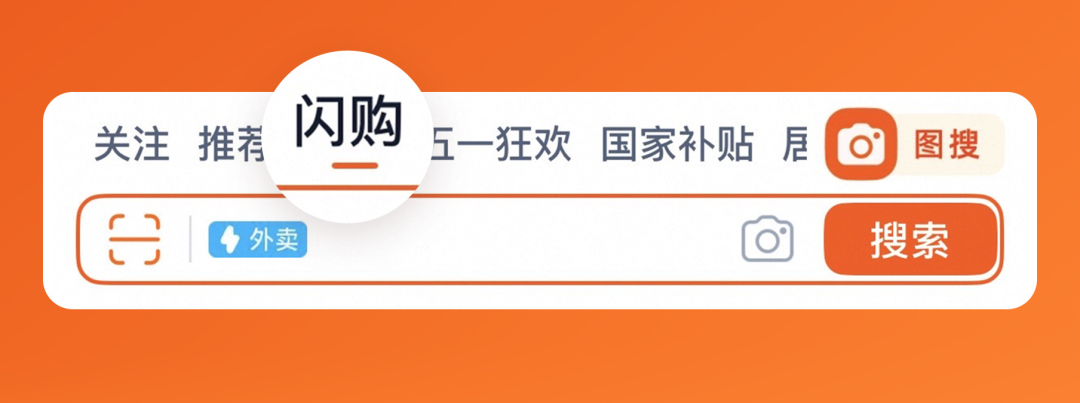Revolutionizing Retail: Taobao Flash Sale's Bold Move
![]() 05/13 2025
05/13 2025
![]() 710
710
Written by | Wu Xianzhi Xu Zhi
Edited by | Wang Pan
On April 30, Taobao Tmall's "Hourly Delivery" service underwent a significant upgrade, transforming into "Taobao Flash Sale" and securing a prime spot as a first-level traffic entry on the Taobao App's home page. This revamped Taobao Flash Sale is partnering with Ele.me to wield the power of subsidies.

Subsidies serve both immediate and long-term objectives. In the short term, they aim to reclaim merchants and users, bolstering food delivery services and fortifying Ele.me's fulfillment capabilities and B/C-end operations. Long-term, the focus shifts beyond food to instant retail, leveraging local warehouses and store networks of brand merchants to bridge offline barriers and create an instant retail network encompassing food, clothing, general merchandise, pharmaceuticals, and 3C electronics.
The collaboration between Taobao and Ele.me involves Taobao providing main site traffic, subsidies, and a mature brand merchant system, while Ele.me handles delivery fulfillment through its operational, algorithmic, and mapping capabilities.
A key metric is "order volume," closely aligned with Jiang Fan's core objective since taking office: shifting focus from GMV to emphasizing consumer demand conversion, with order volume as the benchmark.
Therefore, evaluating Taobao Flash Sale's entry goes beyond food delivery.
In recent years, Taobao Tmall has faced an uphill battle. In the basic e-commerce market, it struggles with competitors like Pinduoduo, Douyin E-commerce, and JD.com in pricing, traffic, and timeliness. In instant retail, whether it's fulfillment efficiency, algorithms, or ground promotion and merchant analysis, Taobao lags behind Meituan, which has long been battle-hardened.
A source, Yuan Yu (pseudonym), revealed to Photon Planet that Meituan Flash Sale has attracted numerous brand merchants for A/B testing due to its swift feedback. Furthermore, since the food delivery war, Meituan Flash Sale's order volume has surged by 40%, reflecting Meituan's deep accumulation and rapid response mechanisms.
This may stem from Alibaba's prolonged period of "easy money," resulting in a diminished capacity for intense competition. While subsidies drive short-term order volume spikes, Taobao Flash Sale still has a long journey to truly solidify its market position.
Food Delivery: A Strategic Bonus
Unlike Ele.me's "passive" response, Taobao's entry into instant retail reflects a broader ambition for offline expansion, aiming to regain merchants and spur growth ahead of 618.
While the timing of Flash Sale's launch might suggest a solid foundation, March is Alibaba's evaluation season, marked by staffing and budget uncertainties, fostering a sense of "aspiration without the means."
Compared to JD.com, Alibaba initially relied on the "New Retail" strategy, boasting extensive instant retail resources. Offline, Alibaba once held a vast portfolio of hypermarkets, mom-and-pop stores, and multiple near-field retail segments under the MMC business group.
Early on, it integrated RT-Mart and Intime into its ecosystem through digitization, holding sway over hypermarkets. In 2021, the MMC business group was formed to digitize small store retail through Lingshou Tong and Hema Jishi. However, with the successive disposal of RT-Mart and Intime, and the silencing of the MMC business group, followed by Taobao Maicai's comprehensive shutdown of its next-day self-pickup business in March, Alibaba's offline retail segment suffered a severe setback.
This New Retail stumble underscores Alibaba's weak offline combat effectiveness. Thus, Taobao Flash Sale's entry can be seen as an "emergency response." An Alibaba employee noted that Alibaba paid a "high price" for New Retail, primarily due to a "lack of understanding and implementation capability among the company and its people" and overlooking that "retail involves human interaction, which technology cannot fully address."
The second system is Tmall Supermarket, a direct-sales e-commerce platform. Initially unrelated to instant retail, with the maturation of Cainiao's warehouse and distribution infrastructure, Tmall Supermarket introduced next-day, half-day, and hourly delivery services, increasing delivery frequency and resembling food delivery in form.
However, entering the era of hourly delivery doesn't mean encrypted logistics can replace food delivery fulfillment.
Logistics fulfillment is essentially "supply"-driven, focused on revitalizing inventory turnover. Goods move from manufacturing to warehouses or from merchants to warehouses, then step-by-step from warehouses to stations, with stations completing the "last mile" delivery. Tmall Supermarket's inventory and distribution timings align with user orders and product contents, and stations follow a fixed delivery process.
In contrast, food delivery fulfillment is "demand"-driven, especially for meals. Riders pick up food at specified locations and deliver it to homes, characterized by randomness and immediacy in store arrival and home delivery.
The third instant retail system within Alibaba is Ele.me, the food delivery platform directly competing with JD.com Delivery and Meituan Delivery. With group resource allocation and increased subsidies, leveraging Ele.me's existing fulfillment, membership system, and platform operation capabilities, it has achieved short-term success.

As mentioned, Taobao Flash Sale's market entry has both short- and long-term goals, with subsidies immediately boosting food delivery in the short term.
Launched in 50 cities on its first day, Taobao Flash Sale was originally scheduled for nationwide rollout on May 6 but launched fully on May 2 ahead of schedule. By May 5 evening, its daily food delivery order volume surpassed 10 million, making it China's fastest food delivery platform to cross the "10 million order" threshold.
Some merchants reported a surge in orders, from 50 on May 1 to 196 on May 6, a nearly 300% increase. Subsidy intensity continues to rise; on May 6, Taobao Flash Sale gave away 100 million cups of milk tea and coffee to consumers through "free meal cards" and "treat cards."
Entering the market amidst Meituan and JD.com's war is partly due to internal sources stating it "saves marketing expenses and subsidizes consumers on a large scale" and partly a forced counterattack amid persistent pressure on Taobao's main battlefield.
Can It Defend the Near-field E-commerce Base?
Under Pinduoduo and Douyin E-commerce's impact, Taobao Tmall's e-commerce share has declined. By 2024, it's estimated to fall below 40%, a stark contrast from over 70% dominance a decade ago.
According to unofficial data from Yuan Yu, domestic e-commerce saw widespread growth in April 2025, but Alibaba's GMV year-on-year growth rate was at the bottom, at only 6.1%. State subsidies drove JD.com's GMV to increase by 12.7% year-on-year, while Pinduoduo and Douyin E-commerce grew by 25.7% and 48.6%, respectively, and Kuaishou E-commerce achieved 15.6% growth.
For Ele.me, order volume may be paramount, but for Taobao, consolidating the brand merchant system is a priority – an extension of the e-commerce battlefield from online to offline. For Alibaba, Flash Sale is both an "active offense" and a "passive defense."
While surpassing 10 million daily orders in just six days, Taobao Flash Sale still lags significantly behind Meituan.
In Q1 2025, Meituan's instant retail order volume increased by 23% year-on-year. In Q3 2024, Meituan Flash Sale's (non-food) daily average order volume exceeded 10 million, peaking at over 16 million. Currently, non-food instant retail handles 18 million daily orders. In late April, JD.com Delivery's daily order volume surpassed 10 million.
From offline to online and then to food delivery, these are all channels for brands to reach consumers. Previously, Taobao Tmall primarily catered to brand merchants' online needs: those with numerous offline stores primarily reached users within a few kilometers. With Taobao Tmall's platform effect and tools like grassroots marketing and traffic investment, brands could reach nationwide users.
With Meituan Flash Sale and JD.com Instant Delivery's entry, retail instantization has become a mainstream trend, gradually becoming a significant brand growth source. Under half-day or even hourly delivery, brand merchants' offline radiation radius expands to tens of kilometers, complementing the "shortcoming" of users within a few kilometers who prefer online consumption.
Therefore, Taobao Flash Sale's launch signifies that the "stagnant" Taobao Tmall doesn't want to watch this share be completely usurped by Meituan and JD.com. It needs to extend its online brand advantages offline and achieve comprehensive, strong binding with brand merchants – hence, food delivery is a bonus, with footwear, clothing, 3C, and daily necessities as the focus. Interestingly, Taobao Tmall once tried footwear and clothing during the food delivery war but saw no results until post-war.
Specifically, instant retail competition hinges on turnover speed, relying on "fast delivery" and "high sales," corresponding to platform fulfillment efficiency and user consumption habits, respectively.

Currently, Taobao Flash Sale fully integrates Tmall official flagship stores and "Hourly Delivery" inventory and pricing, covering 200 core brands. However, this new battlefield's competitive landscape differs vastly from e-commerce, posing a greater challenge to Taobao Tmall.
As mentioned, once monopolies form in China's giant enterprises, making money becomes exceedingly easy, as exemplified by BAT in the past.
In other words, after "easy money" for too long, it becomes difficult for enterprises to bend down and earn "hard money." Alibaba's declining e-commerce share, surpassed by Pinduoduo in details, is the best evidence.
The instant retail field is undeniably "hard money." If Taobao Tmall wants to gain a foothold and defend the near-field e-commerce base, it may need to demonstrate far greater determination and effort than in e-commerce.
In the short term, look at subsidies; in the long term, look at "internal strength."
In instant retail, a "three kingdoms" pattern has emerged among Taobao, Meituan, and JD.com. In logistics capacity, Taobao Flash Sale relies on Ele.me's 4 million riders, comparable to Meituan's 5 million. While JD.com accelerates rider recruitment, it still lags behind the first two.
Yuan Yu noted that JD.com Delivery's current biggest challenge is logistics capacity. Due to rapid order growth, some cities' logistics can't keep up. JD.com adjusted its initial plan to recruit 50,000 full-time riders to 200,000 while reducing subsidy intensity, shifting to shared responsibility between merchants and the platform.
However, Meituan, with a longer market cultivation, still leads in ground promotion, merchant analysis, and infrastructure. In 2024, Meituan Convenience Store Flash Warehouse added 1,866 stores in the sink market. By the same year's Q3, Meituan Flash Warehouses exceeded 30,000, expected to surpass 100,000 by 2027.
The current game's focal point may lie in the supply side. Judging by the companies' genes, JD.com may focus on 3C and electronics, while Taobao may prioritize footwear, clothing, and beauty.
Public information shows that Meituan Flash Sale collaborates with over 5,600 large chain retailers, 410,000 local small merchants, and 570 brand merchants. In digital and home appliances, Apple, Xiaomi, Huawei, etc., are on board; in clothing, there are leading brands like Bestseller Group, Decathlon, Heilan Home, and Semir; in beauty and maternal and child products, giants like Watsons, Sephora, Wyeth, Nestlé, and Danone have deep ties with Meituan Flash Sale.
Taobao Tmall's brand advantage does not necessarily outshine Meituan in the flash sale arena, with potential breakthroughs possibly emerging in footwear and apparel. As Taobao Tmall gradually integrates its extensive brand merchant resources, it may carve out a niche in the future. For instance, in addition to the previously mentioned Bestseller Group and Decathlon, brands like MO&Co., CHARLES&KEITH, Hodo, Septwolves, Wanshili, Xingmian, and Janesville have also joined Taobao Flash Sale.
According to a LatePost report, two prominent global apparel brands and retail giants are expediting negotiations and grayscale testing with Taobao Flash Sale, having yet to venture into Meituan's flash sale platform.
From a user habit perspective, footwear and apparel have traditionally been strong categories for Taobao Tmall. As competition intensifies, brand merchants might reallocate resources towards Taobao Flash Sale. In January of this year, following the entry of Bestseller Group's three major brands—JACK&JONES, VERO MODA, and ONLY—into Taobao Hourly Delivery, sales soared during the 38th Promotion, with ONLY's transaction volume jumping by nearly 300% and JACK&JONES and VERO MODA's transaction volumes increasing by over 200%.

In a comprehensive assessment, Meituan boasts solid fundamentals and established user habits, fortified by its delivery and routing algorithms, which competitors will find challenging to match in terms of data accumulation. JD.com enjoys a favorable public opinion position, while Taobao Flash Sale leverages its complementary strengths in group combat and abundant brand merchant resources.
However, it's crucial to consider that as subsidy intensity wanes, how much order volume will persist? Taking Douyin Delivery in 2023 as an example, daily order volumes surpassed 100,000 in late April and May due to consumers' pre-May Day holiday coupon stocking habits and platform subsidies. Subsequently, with subsidy reductions, order volumes retreated to approximately 20,000-30,000 orders.
Yuan Yu anticipates that JD.com Delivery's order volume could reach 20 million orders per day during the 618 shopping festival. Assuming the initial round of subsidies doesn't alter order volume growth, they could theoretically last from July to October, with subsidies expected to further increase by year-end.
Taobao Flash Sale Delivery's focus is on revitalizing fulfillment, aiming to sustain brands' offline business. In the long run, attracting more brand merchants will be pivotal in dominating the instant retail market. Beyond delivery speed, brand merchants prioritize platforms that maximize sales and truly function as a "third channel," transcending traditional online and offline boundaries.
This is a pivotal "tough battle" for Taobao. Merely replicating e-commerce's past success may yield only fleeting results. To secure long-term gains in this new frontier, Taobao needs unwavering determination, substantial resource support, and the willingness to engage in the "dirty and tiring work." After all, in front-line "hand-to-hand combat," Meituan has always been fearless, and JD.com has consistently demonstrated resilience through years of diligent effort. When the battle commences, the combat effectiveness of front-line personnel becomes fundamental—an area where Taobao must focus its improvement efforts.







